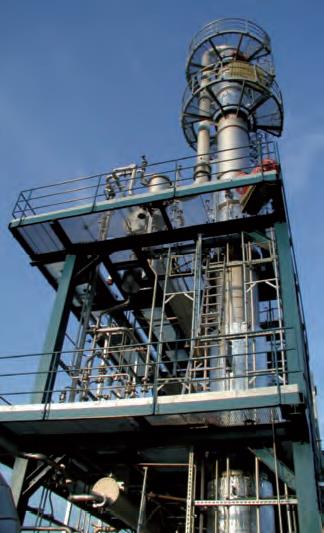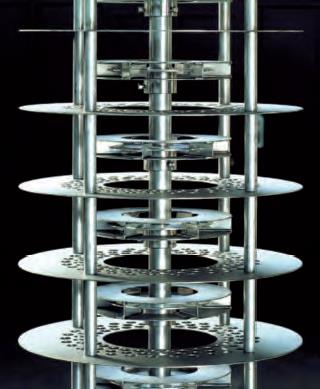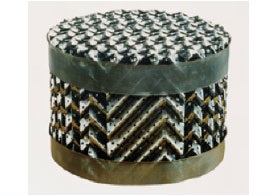
Since the early 70s, Sulzer Chemtech has been a pioneer in the use of static mixers in the homogenization and dispersion of gases and liquids, without resorting to moving parts. The development and technological innovation have represented a diversification towards the areas of heat transfer, reaction and processing in the production of polymers, over a very wide range of fluids and process conditions.
Today, Sulzer is the undisputed leader in the market and applies the latest technologies to cover the global needs of its customers with a wide range of products. Their solutions are supported by the experience provided by more than 70,000 references and the latest techniques in development, customer testing, CFD modeling, engineering and manufacturing to cover the challenges of their clients’ processes.
DISTILLATION AND ABSORPTION
The distillation process is the most used separation technology. SULZER Chemtech has been supplying process solutions in this field since 1940. To date, more than 100,000 columns operate with SULZER equipment, in more than 500 different applications.
– Continuous distillation and batch.
– Distillation of a stage and multistage.
– Extractive distillation.
– Azeotropic distillation.
– Distillation with pressure change.
– Reactive distillation.
– Fractionation columns.
Its portfolio includes an exclusive and complete range of columns internals from last generation and high performance:
– Structured filler (such as MellapakPlusTM and BXPlusTM gauzes).
– Random filler.
– Plates (conventional, high performance and cartridges trays).
– Internals of the column (such as distributors and collectors).
– Vapor- líquid demisters and liquid-liquid phase separators (such as KnitMeshTM drop separators and MellachevronTM pallet packs).
The design of activities is reinforced with computer simulations and pilot plant tests. SULZER CHEMTECH offers to them a basic engineering package that includes the main equipment (columns housings, internal elements, heat exchangers and decanters), or a complete unit assembled on structure, often including the control of processes and the services of support after start-up.
Reactive distillation is the combination of distillation and chemical reaction in a single operating unit. This technology is of great value for limited equilibrium reactions, such as esterification. The level of conversion is increased by the continuous removal of the reaction products from the reaction zone by distillation. In general, reactive distillation units have:
– Less distillation columns.
– Recirculation currents.
– Small recycling stream or without it.
– The use of heat of reaction for mass transfer.
– Higher efficiency of the product.
– Low capital investment.
– Reduction of energy costs.
liquid-liquid extraction:
The liquid-liquid extraction of SULZER CHEMTECH is a technology of separation, technically sophisticated, that offers a solution where other technologies are not appropriate or profitable.
In this complex separation process the components are extracted from the feed stream with the help of an extractant or solvent. The components to be extracted have different solubility in the two immiscible or partially miscible liquids. Both liquids have to be completely contacted and separated later. The liquids flow to counterflow and the required efficiency and purity determine the number of separation stages.


KÜHNI AGITATED COLUMNS (ECR)
This is the column that is used in applications with high mass transfer and / or changing physical properties. The geometry of the compartment can be adapted to compensate for changing conditions in a high-performance column. The main features are the special mixing turbines and perforated separation plates.
PACKED COLUMNS (ECP)
The main benefit of a packed column is the high performance, which leads to small column diameters. Together with specially adapted liquid dispensers, our structured filling provides the best extraction performance.




